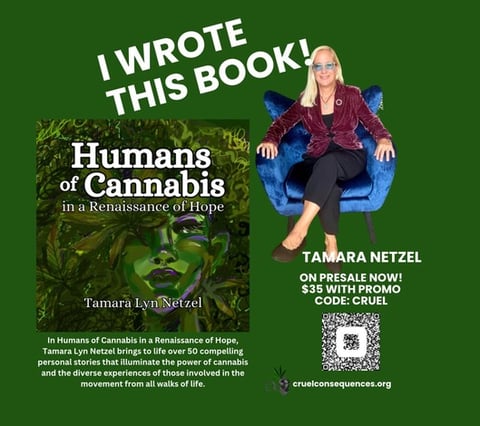An Interview w/ Tamara Netzel, Author of Humans of Cannabis in a Renaissance of Hope
This interview explores Tamara's reflections and insights on the release of her new book and the powerful testimonials it contains.
Riley Carper
9/11/20247 min read


For over a year, I've been considering starting a blog for the BCA, but I've struggled to decide on the right content. Recently, I saw Tamara discussing her upcoming book on our Facebook page, and she generously shared a preview. The moment I read the first testimonial, I knew it had to be our inaugural blog post.
Tamara Netzel founded the "Cruel Consequences: Portraits of Misguided Law" traveling exhibit in 2018. After experiencing relief from Multiple Sclerosis symptoms through medical cannabis, Tamara became a passionate advocate. A former middle school English and Civics teacher, she endured 16 years of debilitating chronic pain caused by liver failure from her MS medications. A friend's suggestion led her to try cannabis oil, and she subsequently joined Virginia NORML and a group of mothers advocating for medical cannabis legalization for their children with Epilepsy and themselves.
I extend my deepest gratitude to Tamara for her tireless work on behalf of cannabis users in Virginia and for participating in this interview. If her story resonates with you, please consider supporting her mission by purchasing her new book, "Humans of Cannabis in a Renaissance of Hope," available now.
What inspired you to collect and share these personal stories about the positive impact of cannabis?
I've always been drawn to reading other people's stories. Biography is probably my favorite genre. In the past, I was an English teacher and a journalist. I enjoy learning about people and how they navigate life. My journey in the cannabis space started when I shared my own story, testifying in 2018 for Virginia's medical cannabis laws. Later, I was invited to appear on the national television show Dateline when they did a feature on Virginia cannabis advocates.
Dateline has changed its format since then. It used to be a news show, but now it focuses primarily on true crime. My husband and I joke that we were on Dateline, but you can see we're both alive and well – no one killed anyone! It was a different kind of show back then.
That experience inspired me to continue sharing personal stories of marijuana criminalization, which I did through my nonprofit, Cruel Consequences: Portraits of Misguided Law – a 501(c)(3) nonprofit where these stories are told through beautiful visual portraits. In 2020, I used these stories to write my first book, "The Human Cost of Marijuana Prohibition." My second book, "Humans of Cannabis: A Renaissance of Hope," continues my efforts to tell personal cannabis stories. But now, the focus is on the advocates, activists, and people who need cannabis medicine, whether they identify as medical patients or legal adult users.
How did you find and select the individuals whose stories are featured in your book?
I put out an open call on all my channels, inviting people to sign up to be featured in this book. I wanted the process to be organic and showcase the beauty of the cannabis community that has always captivated me. It's fascinating how people from all walks of life are drawn to this plant and genuinely care about others within the community. I've made the most unexpected friendships in the cannabis world. This book is my way of celebrating the diversity within our community and encouraging people to connect with one another, rather than judging based on appearances or preconceived notions about cannabis.
Was there a particular story that resonated with you the most?
That's a tough question to answer. Each of these stories is unique and special. Every individual has overcome some form of trauma or challenge, and many share unexpected details about themselves that challenge the stigma surrounding cannabis consumers.
Several stories intertwine: there's a nurse who, before starting her cannabis business, helped her sister with cannabis medicine. Both of them are featured in the book. There's a veteran who made a new friend he assisted with FECO oil; they're both in the book as well. There's an addict who grows cannabis and gives it away to the homeless without consuming it himself, and another addict who manages Greenhouse RVA, an addiction recovery house where cannabis is part of the recovery process. This manager openly discusses his faith in Jesus and the importance of prayer in his life. Several people in the book share their faith and how cannabis plays a role in their spiritual practices, like the LGBTQ+ community activist who lived through the AIDS crisis and identifies as a Roman Catholic.
There are other LGBTQ community members featured, including one who shares the harrowing true story of being targeted in a 2021 hit in Virginia Beach, orchestrated by someone within the cannabis industry. The book includes a picture of him in the hospital after the attack, juxtaposed with a recent photo. His colleague, who was also injured in the incident, is also featured.
I could go on, but truly, each story holds something special. It's impossible for me to pick a favorite.
Did any of the stories surprise you or challenge your own perceptions of cannabis?
Absolutely. The choices each person makes with cannabis are deeply personal. Several stories touch on addiction and how cannabis has helped, but it was truly thought-provoking to learn about someone who grows cannabis responsibly, recognizing their own limits while sharing it with those who benefit.
The book also features young people in their 20s who are already business owners, and several others who defy the "lazy stoner" stereotype by achieving milestones like home ownership in their early 20s. Their stories are inspiring and showcase the diverse paths and successes within the cannabis community.
How do you hope these personal narratives will influence the conversation around cannabis?
I hope readers will recognize the diversity within the cannabis community, while also being inspired by our shared humanity. The book features a mix of well-known figures and everyday individuals, but each one is humanized by sharing their personal story. Many share anecdotes that reveal a lot about their character, helping you understand their perspectives. For instance, Kat Murti of SSDP, who advocates for decriminalization of all drugs, shares a poignant childhood story that resonates deeply and encourages the reader to empathize with her viewpoint.
Do you feel these stories have the power to change hearts and minds more effectively than data and statistics alone?
Absolutely, I firmly believe that these stories possess a unique power to transform hearts and minds in a way that data and statistics simply cannot. This book allows you to connect with real people and understand the motivations behind their choices. Personal narratives have a profound ability to foster empathy and understanding, which can lead to more informed and compassionate policy decisions that truly help people.
How do you think sharing these personal stories can help reduce the stigma surrounding cannabis use?
We need to cultivate deeper understanding. These stories empower us to challenge our own ingrained beliefs about cannabis use, shaped by 80 years of propaganda that have seeped into our collective consciousness. In legal states like Virginia, it's not necessarily policy or laws that harm people who use cannabis, but rather the lingering stigma that prevents employers from hiring them or keeps them from pursuing opportunities like owning cannabis-related businesses.
Even after accepting cannabis as medicine for myself, I'll admit, I was hesitant to engage with the cannabis community. I still held onto the biases that had prevented me from learning more. I sense that there are others out there who express support for cannabis but still harbor stigma and bias, unconsciously perpetuating behaviors that hinder others.
What role do you see storytelling playing in the broader movement for cannabis acceptance and legalization?
Storytelling plays a crucial role in the movement for cannabis acceptance and legalization. Even more vital is the act of individuals sharing their own stories. My work helps empower others to do just that. Telling your own story can be a powerful catalyst for healing. The cannabis community is in need of significant healing, and by healing together, we can shift our focus towards our shared humanity rather than our differences. When we learn to respect each other's individuality and collaborate towards a common goal, our community becomes stronger and more capable of achieving the outcomes we all desire.
Do you think these stories can empower individuals to advocate for their own right to use cannabis?
I am confident that these stories will continue to empower others to advocate for their rights. I believe everyone will find someone in this book to identify with.
Some critics might argue that anecdotal evidence is not enough to justify policy change. How do you respond to that?
Policies are designed to help people. If we don't invest the time to truly understand those we aim to serve, what kind of policies are we crafting? Our world is growing increasingly divided. Social media isolates us, preventing us from taking the time to get to know people before judging them. Anecdotal evidence provides the human context behind policy-making. While data and statistics are crucial, they alone cannot justify policy. The beauty of the cannabis conversation is that we have both. Anecdotal evidence breathes life into the statistics and data, making them tangible and relatable. Statistics and data alone often fail to move people to action. However, when someone can gaze at a portrait, read a personal story, and perhaps even imagine themselves in that person's shoes, hearts and minds are truly touched.
Take, for instance, the firefighter in the book who advocated for employment protections for medical cannabis patients in Norfolk. Without understanding the challenges firefighters face and why they might need medical cannabis, how can one grasp the necessity? I didn't understand it myself initially. But when you witness what they endure and how alcohol is readily accepted off duty while cannabis is not, empathy emerges.
How do you address the concern that highlighting positive stories might overshadow the potential risks associated with cannabis use?
These positive stories illustrate how cannabis is used by responsible adults who are aware of the potential risks. The story about the addict who cultivates cannabis for the homeless but doesn't consume it himself exemplifies this responsible approach. Another story features someone who helps others with cannabis but is mindful of their own sensitivity and can only microdose. These stories, far from promoting irresponsible use, actually serve as models of responsible behavior within the cannabis community.
